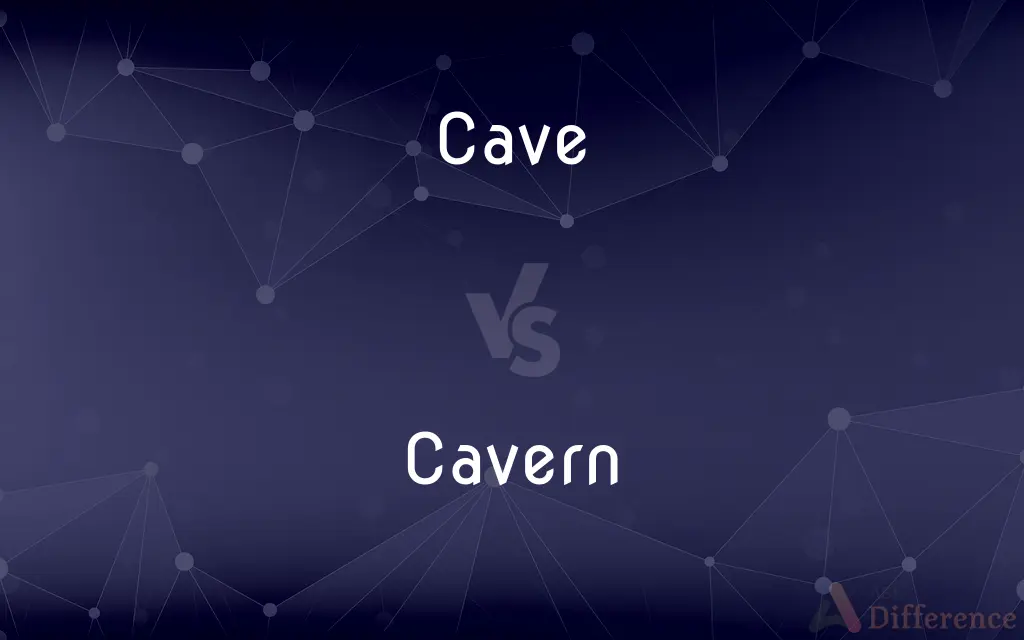Cave vs. Cavern — What's the Difference?
By Tayyaba Rehman — Updated on September 19, 2023
A cave is a hollow or natural void beneath the earth's surface, while a cavern is a specific type of large, often ornately decorated cave. Every cavern is a cave, but not every cave is a cavern.

Difference Between Cave and Cavern
Table of Contents
ADVERTISEMENT
Key Differences
The terms Cave and Cavern often evoke images of underground spaces, darkness, and mystery. While both refer to hollow spaces beneath the earth, their scale and formation differ.
A cave, in general, is any hollow space or void in the earth, large or small. This broad definition means caves can be found everywhere, from mountainsides to seashores. Caves can be the result of various geological processes including erosion, tectonic forces, and volcanic activity.
Cavern, however, is a more specific term. A cavern is essentially a type of cave, but one that is particularly large, and often ornately decorated with stalactites, stalagmites, and other mineral formations. Caverns can be vast, spanning many miles, and are often the result of prolonged erosion, typically from flowing water.
To put it simply, all caverns are caves, but not all caves are caverns. While the entrance to a cave might be narrow and small, leading to a simple hollow, a cavern's entrance often opens up to a massive and intricate underground system.
Both caves and caverns are vital to the study of geology and human history. Many caves and caverns around the world are preserved as sites of natural beauty, historical significance, or both.
ADVERTISEMENT
Comparison Chart
Definition
A natural void or hollow beneath the earth's surface.
A large, often ornately decorated cave.
Size
Can be small or large.
Typically large.
Formation
Result of erosion, tectonics, or volcanic activity.
Primarily from prolonged erosion, often by water.
Occurrence
Common and can be found worldwide.
Less common than caves.
Decorations
May or may not have stalactites or stalagmites.
Often decorated with stalactites, stalagmites, etc.
Compare with Definitions
Cave
A natural underground space of considerable size.
The explorers discovered a new cave in the mountain.
Cavern
A cave, especially one that is large and intricate.
The cavern system stretched for miles, with chambers connected by narrow tunnels.
Cave
A place providing privacy or seclusion.
He retreated to his man cave for some relaxation.
Cavern
An immense, often ornately decorated underground space.
Legends spoke of a hidden cavern filled with treasures.
Cave
A cave or cavern is a natural void in the ground, specifically a space large enough for a human to enter. Caves often form by the weathering of rock and often extend deep underground.
Cavern
A vast, hollowed-out space.
The echo in the cavern was deafening.
Cave
A natural underground chamber in a hillside or cliff
The narrow gorge contains a series of prehistoric caves
Cavern
A large cave of room-size or larger.
The cavern was filled with stunning rock formations.
Cave
Explore caves as a sport
They say they cave for the adventure, challenge, and physical exercise
Cavern
An underground chamber often filled with stalactites and stalagmites.
Visitors were amazed by the beauty of the limestone cavern.
Cave
Capitulate or submit under pressure; cave in
He caved because his position had become untenable
She finally caved in the face of his persistence
Cavern
A large cave or chamber in a cave.
Cave
(among children) look out!
Cavern
A large cave.
Cave
A hollow or natural passage under or into the earth, especially one with an opening to the surface.
Cavern
A large underground chamber, as in a cave.
Cave
A storage cellar, especially for wine.
Cavern
To enclose in or as if in a cavern.
Cave
To dig or hollow out.
Cavern
To hollow out.
Cave
To cause to collapse or fall in. Often used with in
The impact caved in the roof of the car.
Cavern
A large cave.
Cave
To fall in; collapse. Often used with in
The walls caved in during the earthquake.
Cavern
An underground chamber.
Cave
To give up all opposition; yield. Often used with in
The school committee caved in to the demands of parents.
Cavern
A large, dark place or space.
A dark cavern of a shop
Cave
To explore caves.
Cavern
(transitive) To form a cavern or deep depression in.
Catacombs caverning the hillsides
Cave
A large, naturally-occurring cavity formed underground or in the face of a cliff or a hillside.
We found a cave on the mountainside where we could take shelter.
Cavern
(transitive) To put into a cavern.
Cave
A hole, depression, or gap in earth or rock, whether natural or man-made.
Cavern
A large, deep, hollow place in the earth; a large cave.
Cave
A storage cellar, especially for wine or cheese.
This wine has been aged in our cave for thirty years.
Cavern
Any large dark enclosed space;
His eyes were dark caverns
Cave
A place of retreat, such as a man cave.
My room was a cozy cave where I could escape from my family.
Cavern
A large cave or a large chamber in a cave
Cave
(caving) A naturally-occurring cavity in bedrock which is large enough to be entered by an adult.
It was not strictly a cave, but a narrow fissure in the rock.
Cavern
Hollow out as if making a cavern
Cave
(nuclear physics) A shielded area where nuclear experiments can be carried out.
Cave
Debris, particularly broken rock, which falls into a drill hole and interferes with drilling.
Cave
(mining) A collapse or cave-in.
Cave
The vagina.
Cave
A group that breaks from a larger political party or faction on a particular issue.
Cave
(obsolete) Any hollow place, or part; a cavity.
Cave
(programming) A code cave.
Cave
To surrender.
He caved under pressure.
Cave
To collapse.
First the braces buckled, then the roof began to cave, then we ran.
Cave
To hollow out or undermine.
The levee has been severely caved by the river current.
Cave
To engage in the recreational exploration of caves.
I have caved from Yugoslavia to Kentucky.
Let's go caving this weekend.
Cave
(mining) In room-and-pillar mining, to extract a deposit of rock by breaking down a pillar which had been holding it in place.
The deposit is caved by knocking out the posts.
Cave
To work over tailings to dress small pieces of marketable ore.
Cave
(obsolete) To dwell in a cave.
Cave
Look out!; beware!
Cave
A hollow place in the earth, either natural or artificial; a subterraneous cavity; a cavern; a den.
Cave
Any hollow place, or part; a cavity.
Cave
A coalition or group of seceders from a political party, as from the Liberal party in England in 1866. See Adullam, Cave of, in the Dictionary of Noted Names in Fiction.
Cave
To make hollow; to scoop out.
The mouldred earth cav'd the banke.
Cave
To dwell in a cave.
Cave
To fall in or down; as, the sand bank caved. Hence (Slang), to retreat from a position; to give way; to yield in a disputed matter.
Cave
An underground enclosure with access from the surface of the ground or from the sea
Cave
Hollow out as if making a cave or opening;
The river was caving the banks
Cave
Explore natural caves
Cave
A hollow or recess in a rock formation.
Water had eroded the cliff, forming a small cave.
Cave
A natural chamber or series of chambers in the earth or in the side of a hill or cliff.
The ancient paintings in the cave depicted early human life.
Cave
An underground habitat for animals.
Bats often dwell in dark caves.
Common Curiosities
Are all caverns considered caves?
Yes, all caverns are types of caves.
Are caverns found only in certain areas?
Caverns can form anywhere with the right conditions, especially in limestone regions.
Can you live in a cave or cavern?
Historically, yes. Today, while some do, it requires adjustments and provisions.
What causes the decorations inside a cavern?
Mineral deposits from dripping water form stalactites (ceiling) and stalagmites (floor).
Can caves be man-made?
While most caves are natural, there are man-made caves, often for storage or shelter.
Are caves always dark?
Deeper sections of caves lack natural light, making them dark.
Is it safe to explore a cave or cavern without guidance?
No, it's best to have an experienced guide or proper training.
What's the difference between a sea cave and a cavern?
A sea cave forms in coastal cliffs from wave action, while a cavern is a large, often decorated cave.
Why do people tour caverns?
Caverns are renowned for their beauty, size, and unique formations.
Are caves important for science?
Yes, caves offer insights into geology, paleontology, archaeology, and biology.
Can animals be found in caverns?
Yes, many organisms adapt to the unique conditions of caverns.
Which is typically larger, a cave or cavern?
Caverns are typically larger and more intricate than general caves.
Are caves and caverns the same temperature year-round?
Often, yes. Many maintain a consistent temperature due to their insulation.
Is spelunking the exploration of caves or caverns?
Spelunking, or caving, is the recreational exploration of both caves and caverns.
How are caverns beneficial for tourism?
Caverns attract tourists for their natural beauty, history, and adventure opportunities.
Share Your Discovery

Previous Comparison
Recuse vs. Excuse
Next Comparison
Ideal vs. IdeasAuthor Spotlight
Written by
Tayyaba RehmanTayyaba Rehman is a distinguished writer, currently serving as a primary contributor to askdifference.com. As a researcher in semantics and etymology, Tayyaba's passion for the complexity of languages and their distinctions has found a perfect home on the platform. Tayyaba delves into the intricacies of language, distinguishing between commonly confused words and phrases, thereby providing clarity for readers worldwide.
















































